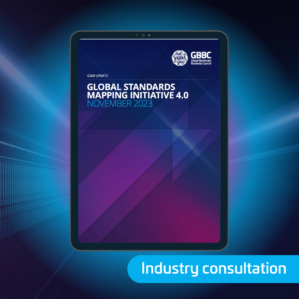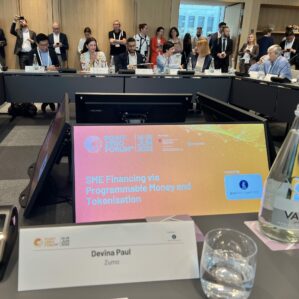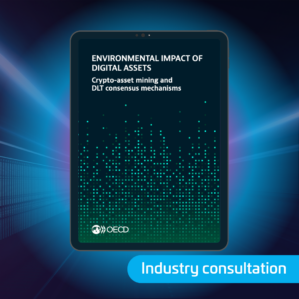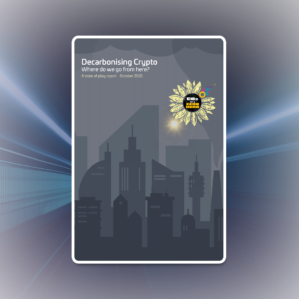

Zumo takes part in Central Bank of Hungary hosted discussion around global coordination on cryptoassets and climate change at Point Zero Forum 2023 in Zurich.
A globally pressing topic
Cryptoassets and climate change are two global topics that increasingly find themselves top of the worldwide policy-making agenda. Just this week, the International Sustainability Standards Board (ISSB) issued its inaugural standards – IFRS S1 and S2 – ‘ushering in a new era of sustainability-related disclosures in capital markets worldwide’. And from a digital assets perspective, international bodies from the FATF to IOSCO to the FSB to the IMF have all voiced opinions as to how the industry should be regulated across borders, now finding its application – not least in relation to sustainability disclosures – in individual jurisdictions worldwide.
It is perhaps no surprise then to see the two topics of cryptoassets and climate change coming together in the consideration of how the environmental footprint of digital assets can be effectively assessed and managed at the global level. Such was the agenda at the cryptoassets and climate change roundtable at Point Zero Forum 2023 in Zurich, which convened experts from Zumo, the Cardano Foundation, Celo, ConsenSys, Ethereum Climate Platform, and Near Foundation to examine the topics of data collection and measurement of cryptoassets’ carbon footprint; the use cases for sustainable crypto activities; and regulation for sustainability.
Held at the Point Zero Forum 2023, an international gathering of central banks, regulators and industry leaders for discussing emerging policy-technology issues, Zumo was honoured to once again feed into the discussion for aligned, globally adaptable regulation as presented to the panel by our CFO Devina Paul. Detailed feedback will be collated into a white paper to be released in the weeks after the event, with our key takeaways summarised for you below.
Success of Ethereum’s “the merge” and feasibility for Bitcoin
Can we declare that Ethereum’s “The Merge” was a success from an environmental perspective? Is it feasible for Bitcoin to change to PoS?
Ethereum’s ‘merge’ was a major development for the blockchain that resulted in a decrease of carbon emissions by over 99%. The potential for Bitcoin to adopt a Proof-of-Stake (PoS) model like Ethereum is complex, given the decentralised nature of Bitcoin, the security and technology tradeoffs inherent in different consensus models, and the planning and coordination required for such a transition. As we continue forwards, Zumo has actively participated in initiatives such as BlockGarden that aim to account for historical Ethereum emissions, demonstrating the commitment to a greener blockchain environment.
Exploring carbon negative blockchains
How do carbon negative blockchains operate in practice? What kind of offsetting and regenerative initiatives do exist?
There’s a concern here that the term ‘carbon negative’, which refers to actually removing CO2 from the air, is getting confused with carbon avoidance, which is what you see with operations such as Bitcoin mining using flared or vented methane gas, for instance. The potential to deliver positive change is there, but we must be alive to the greenwashing risks for claims of carbon-negative blockchains, which reflects the urgent need for standardisation and clearer descriptions and definitions.
Leveraging web3 to combat climate change
How can Web3 be leveraged to combat climate change, and what are some notable innovations?
Web3 technology holds significant potential to combat climate change, with notable innovations in areas such as offset verification and reporting transparency. Blockchain technology enables public tracking of climate actions in an auditable manner, and it ensures the robustness of underlying data. This technology can also pave the way for tokenised ESG asset marketplaces, providing new financing routes and supporting direct climate action. Zumo has been actively working on bringing transparency to the offset and renewable energy certificate (REC) markets, addressing the limitations of the current Web2 system. The emergence of tokenised marketplaces for ESG assets, such as GMEX ZERO13, provides liquidity and accessibility to a broader investor base. Despite facing heavy criticism for its environmental impact, the crypto sector holds significant potential for sustainable innovation. As an agile industry, it can quickly mobilise to realise blockchain applications that contribute to mitigating climate change.
Using renewable energy sources and minimising energy consumption
Is there any potential for using renewable energy sources to power the transactions of crypto-assets, or is the ambition the minimization of energy consumption?
As the energy consumption of blockchain continues to be a pressing concern, the focus is now shifting towards renewable energy sources. While it is important to strive for a reduction in energy use as a primary objective, proof-of-work in particular has energy-intensive mechanisms built into it that are deliberately designed that way for the security of the network. Such design decisions are outside of the direct influence of the end company or user, which is why companies like Zumo are turning to renewables to mitigate impact. Technologically, decarbonising is much easier for digital assets than other industries such as aviation or transport. We already have the technology for renewable electricity, and with that the responsibility to act quickly.
Regulatory landscape and reporting
What is the role of regulation to promote sustainable cryptoassets?
The regulatory landscape for environmental sustainability is rapidly evolving, with specific regulations targeting the blockchain sector and broader sustainability reporting requirements.
MiCA in Europe for example calls on cryptocurrency businesses to declare information on their environmental and climate impact. On a higher macro level we have CSRD from the European Union which will require businesses to do sustainability reporting alongside financial reporting. Where historically sustainability reporting has been a choice for companies, it will now have to be reported on, and audited alongside financial accounts. The impact for us as a sector is that we need to have agreed and standardised methodologies now, as it will take a while for us all (companies) to collect the data, validate it, audit it and ensure we’re all satisfied on how it’s been reported on.
Comparable and transparent measurement methodologies, along with careful selection of tokenised market instruments such as RECs and offsets, are essential to accurately account for and report on emissions.
Where next?
The digital asset space and its interface to climate challenges – as well as potential climate regeneration – is a particularly fast-moving one. To keep moving forwards, we must create the environment for solutions and best practice to flourish, even while recognising the imperfections and shortcomings that come with bringing new ideas to life. That means scaling and embedding current pockets of good practice throughout the sector. Regulation will bring both a need for disclosure and a need to standardise and, applied proportionately, will push the sector forwards. To prepare, the digital asset community must realise the imperative, and continue to work to develop coherent and repeatable standards for measurement that allow for the digital assets vision to be delivered in a verifiably sustainable way. At its best, we believe the sector is up to that task.
Practical actions in quantifying and accounting for emissions
Zumo has been at the forefront of quantifying and accounting for emissions associated with digital assets. We started by calculating our own carbon footprint and discovered the significant impact of the blockchain component, which accounted for over 90% of our carbon emissions in 2021. Taking proactive steps, Zumo launched its net-zero strategy in 2020 and received a grant from Innovate UK in 2021. We subsequently introduced “Oxygen” an initiative aimed at combating emissions associated with digital assets. Zumo’s efforts highlight the importance of understanding and addressing the carbon footprint of cryptoassets.
Photos & Videos































